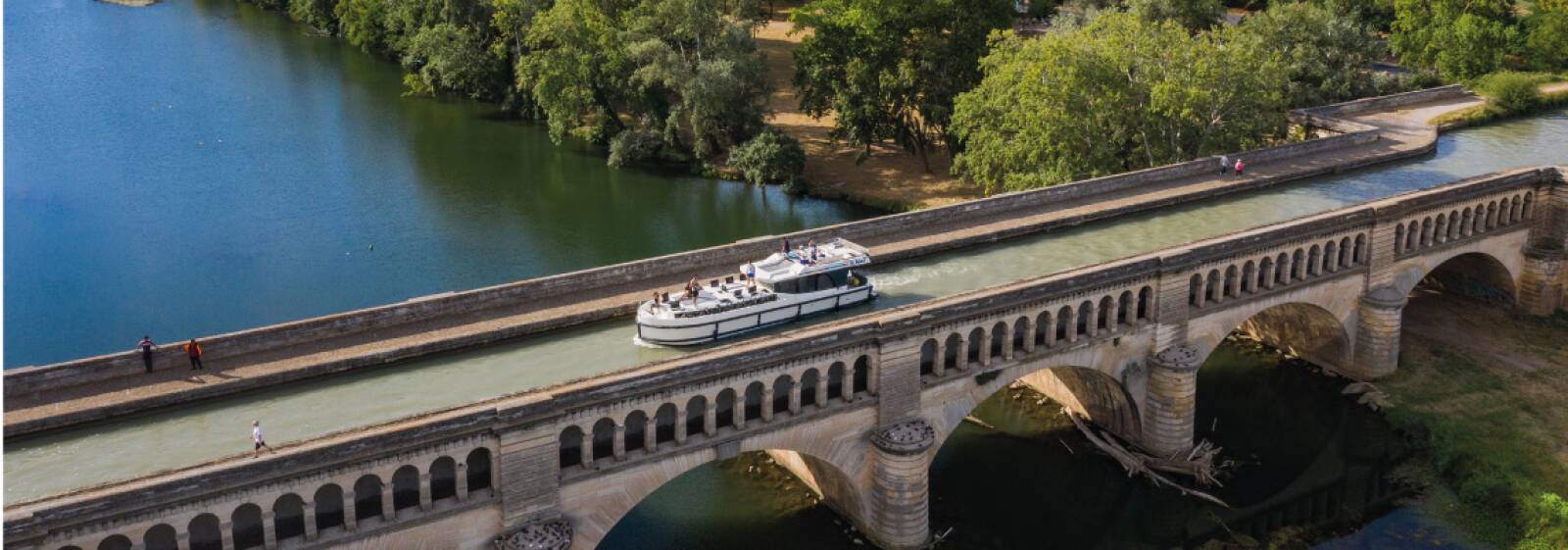
River Cruise Homps / Carcassonne / Castelnaudary
Crisboat - Expert in river boat rental for over 20 years
Homps - Carcassonne - Castelnaudary - 80 Km - 44 Locks - 19 h of navigation - 5 Nights
From Homps to Puichéric, 10 km, 3 Lock(s), 1.9 h of navigation
 Monument
Monument
Puichéric
A village with a medieval character located along the Canal du Midi, also known as “the Venice of Minervois” due to the three rivers that flow through it. It has a timeless charm that should not be missed. Monument
Monument
Homps
A small village known for its harbor and pleasant recreational lake, Lac de Jouarres. Don’t forget to stop by the Maison des Vins du Minervois at the port, which offers a selection of the best wines. The famous blue footbridge leading to Lac de Jouarres is worth a visit. Vineyard
Vineyard
The Wine House
At the port of Homps, you will find the Minervois Wine House, which offers a selection of the finest wines and showcases the expertise of winemakers from the Aude region. Swimming
Swimming
the pond of Jouarre/Homps
A 100ha lake, situated a few meters from the Canal du Midi, where it is possible to bathe. Sports and leisure activities
Sports and leisure activities
the pond of Jouarre/Homps
A 100ha lake, situated a few meters from the Canal du Midi, where it is possible to go sailing. River constructions
River constructions
Le Pont-Canal du Rivassel
The Rivassel Aqueduct is one of the many bridges of this kind along the Canal du Midi. It crosses the small "Ruisseau de Naval" stream.From Puichéric to Trèbes, 17 km, 11 Lock(s), 4.5 h of navigation
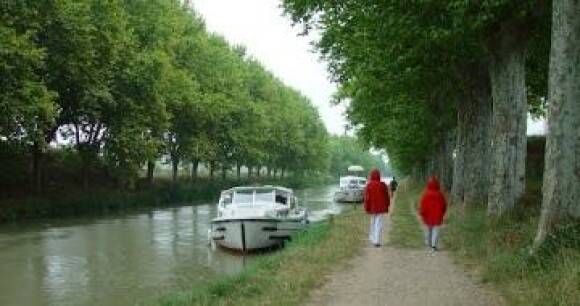
 Monument
Monument
Marseillette
Wedged between the Minervois and Corbières vineyards, today this town is known for producing the most rice in the region; the rice fields can be seen from the lagoon.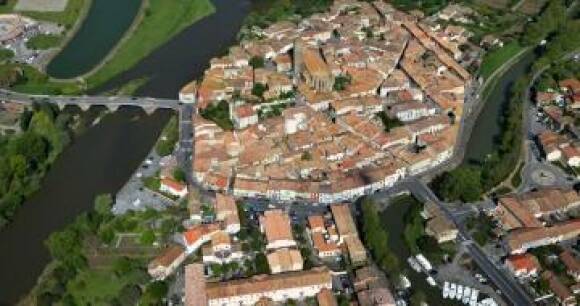
 Monument
Monument
Trèbes
The old village, with its narrow streets, was built around the Church of Saint-Etienne. The latter houses the "Treasures of Trèbes": 320 oak corbels which support the structural beams, each featuring a painted figure: men, women, animals… Monument
Monument
Puichéric
A village with a medieval character located along the Canal du Midi, also known as “the Venice of Minervois” due to the three rivers that flow through it. It has a timeless charm that should not be missed. Monument
Monument
Saint Stephen’s Church
Saint Stephen’s Church, in the Southern Gothic style, houses the "Treasure of Trèbes": 320 oak corbels supporting the beams of a timber frame classified as a Historic Monument. Monument
Monument
La Tour de l’Horloge
The Clock Tower served as a relay station for the world’s first telecommunications network. Nature
Nature
The rice field
The Saint-Gabriel estate, which has focused primarily on winegrowing since 1925, stands out for its 70 hectares of rice-growing. The estate recently launched Orizginale, a gluten-free, organic craft beer made from rice grown on the estate. Vineyard
Vineyard
the Minervois
 Vineyard
Vineyard
the Corbières
 River constructions
River constructions
The Moulins Locks
The Trèbes locks form a lock staircase consisting of three basins. Built around 1674, it is located downstream of the port of Trèbes, at the town’s exit toward the village of Marseillette. Taking advantage of the steep gradient of the lock staircase, a thriving milling industry developed on the left bank of the lock.From Trèbes to Carcassonne, 14 km, 7 Lock(s), 3.3 h of navigation

 Monument
Monument
Trèbes
The old village, with its narrow streets, was built around the Church of Saint-Etienne. The latter houses the "Treasures of Trèbes": 320 oak corbels which support the structural beams, each featuring a painted figure: men, women, animals…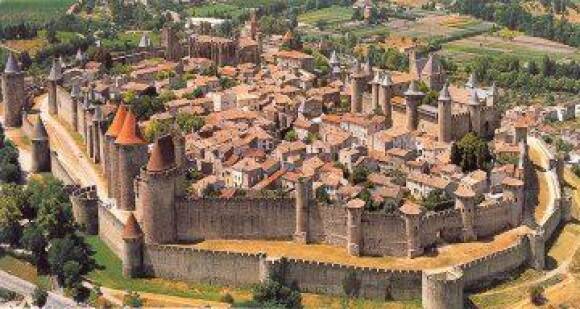
 Monument
Monument
Carcassonne
The medieval city of Carcassonne has had two designations as a UNESCO World Heritage Site since 1997. Dating back to the Roman Empire, this fortified city later became a garrison town. Monument
Monument
La Bastide Saint-Louis
La Bastide Saint-Louis is at the heart of the city. It embodies the warm, friendly spirit of Carcassonne and is home to many shops, restaurants, squares, and parks. Monument
Monument
The Medieval City
Just a 10-minute walk from the Bastide is the famous Medieval City, open free of charge 24/7. Guided tours, both day and night, are offered to uncover the secrets and history of the City. Monument
Monument
The Comtal Castle
In the heart of the medieval city, you will find the imposing Comtal Castle. Admission is paid, but free for visitors under 26 years old. Monument
Monument
Saint Stephen’s Church
Saint Stephen’s Church, in the Southern Gothic style, houses the "Treasure of Trèbes": 320 oak corbels supporting the beams of a timber frame classified as a Historic Monument. Vineyard
Vineyard
the Côtes de Malepère
 Gastronomy
Gastronomy
the Artichauts à la Carcassonnaise
 Gastronomy
Gastronomy
Le Petit Carcassonnais
This small oval cake, with a texture similar to a sponge cake or a madeleine, reveals subtle flavors of candied orange peel when you taste it. This specialty was created in 1928 by Mr. Gau and was later acquired by the Fuster family, who are currently the sole producers of this delicacy. Gastronomy
Gastronomy
Le Poumpet
A cake originating from Soual and Sémalens, brought to Carcassonne in the 8th century, made with lemon and bergamot. Triangular in shape, it was traditionally made with lard. Today, it is usually made with butter. It has gained great popularity thanks to its blend of lemon, bergamot, and honey added after baking. It is perfect for lemon lovers. Gastronomy
Gastronomy
Les Écus de la Cité
By far, this is the sweetest memory you’ll take away from Carcassonne. Small and round in shape, these little coins featuring the medieval city come in dark chocolate or milk chocolate. 7 Avenue Arthur Mullot, 11000 Carcassonne River constructions
River constructions
Pont Marengo
The Marengo Bridge, downstream from Lock 40, is known to be the lowest on the canal. Be sure to warn all your crew members before passing under it. River constructions
River constructions
The Moulins Locks
The Trèbes locks form a lock staircase consisting of three basins. Built around 1674, it is located downstream of the port of Trèbes, at the town’s exit toward the village of Marseillette. Taking advantage of the steep gradient of the lock staircase, a thriving milling industry developed on the left bank of the lock. River constructions
River constructions
Les écluses et le Pont-Canal du Fresquel
The Fresquel site consists of the Fresquel aqueduct, a lock from the era of Pierre-Paul Riquet, and a double lock built at the same time as the aqueduct. The 135-meter reach between the two locks is the shortest on the Canal du Midi. River constructions
River constructions
The Orbiel Aqueduct
This beautiful structure with three arches, where the Canal crosses the Orbiel Valley, was built based on Vauban’s plans in 1688. It is one of the first large canal bridges constructed in France. The original method for crossing the Orbiel was quite different. A causeway had been built to raise the waters of the Orbiel to the level of the Canal. Boats would pass behind this dam to reach the other shore.From Carcassonne to Bram, 23 km, 6 Lock(s), 4.3 h of navigation

 Monument
Monument
Carcassonne
The medieval city of Carcassonne has had two designations as a UNESCO World Heritage Site since 1997. Dating back to the Roman Empire, this fortified city later became a garrison town.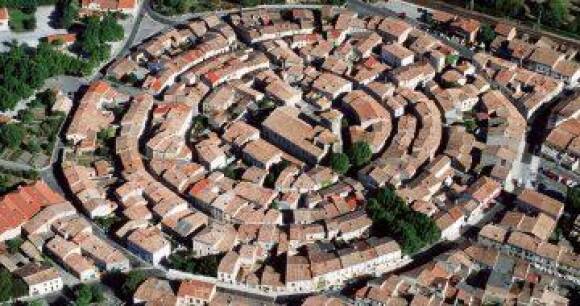
 Monument
Monument
Bram
Bram, the circular town with its 13th century church. At the House of Archaeology you can discover the ancient past of this city. Monument
Monument
Presbytère de Villesèquelande
An old 11th-century building that was part of the village’s former castle, which was destroyed. It was restored in 1991 and has since belonged to the municipality, but traces of Raymond de Villesèquelande’s presence can still be found. Monument
Monument
La Bastide Saint-Louis
La Bastide Saint-Louis is at the heart of the city. It embodies the warm, friendly spirit of Carcassonne and is home to many shops, restaurants, squares, and parks. Monument
Monument
The Medieval City
Just a 10-minute walk from the Bastide is the famous Medieval City, open free of charge 24/7. Guided tours, both day and night, are offered to uncover the secrets and history of the City. Monument
Monument
Villesèquelande
A small, authentic village with just a few inhabitants. It is crossed by an ancient Roman road. It is home to one of the last elm trees in Western Europe, and since 2021, Villesèquelande has even become the world’s first Tree Village. Monument
Monument
The Comtal Castle
In the heart of the medieval city, you will find the imposing Comtal Castle. Admission is paid, but free for visitors under 26 years old. Monument
Monument
The Church of Saint Julien and Saint Basilisse
A true jewel of the village, it is the starting point of the “circular village.” Hidden in the heart of the town, it is one of the rare churches still found in France with a single nave featuring three rib-vaulted bays and a 36-meter bell tower. Come and discover its Gothic architecture, which dominates the village! Nature
Nature
Parc des Essars
The Parc des Essars is an ideal place for a stroll. At the heart of the park is an exhibition centre dedicated entirely to the visual arts and culture. Vineyard
Vineyard
the Côtes de Malepère
 Gastronomy
Gastronomy
the Artichauts à la Carcassonnaise
 Gastronomy
Gastronomy
Le Petit Carcassonnais
This small oval cake, with a texture similar to a sponge cake or a madeleine, reveals subtle flavors of candied orange peel when you taste it. This specialty was created in 1928 by Mr. Gau and was later acquired by the Fuster family, who are currently the sole producers of this delicacy. Gastronomy
Gastronomy
Le Poumpet
A cake originating from Soual and Sémalens, brought to Carcassonne in the 8th century, made with lemon and bergamot. Triangular in shape, it was traditionally made with lard. Today, it is usually made with butter. It has gained great popularity thanks to its blend of lemon, bergamot, and honey added after baking. It is perfect for lemon lovers. Gastronomy
Gastronomy
Les Écus de la Cité
By far, this is the sweetest memory you’ll take away from Carcassonne. Small and round in shape, these little coins featuring the medieval city come in dark chocolate or milk chocolate. 7 Avenue Arthur Mullot, 11000 Carcassonne Swimming
Swimming
Le Lac de Buzerens
Lake Buzerens offers a variety of activities: fishing, supervised swimming, wakeboarding, paddleboarding, and water skiing. River constructions
River constructions
Aqueduc de Rebenty
Cross over the Rebenty stream, originally built in 1687, to prevent the stream's waters from mixing with those of the canal. Composed of four arches, this aqueduct was accompanied by a gatehouse that has now been completely destroyed.From Bram to Castelnaudary, 16 km, 17 Lock(s), 5.5 h of navigation
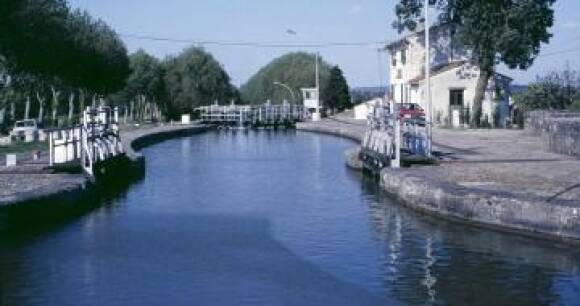
 Monument
Monument
Villepinte
The 12th century Romanesque chapel of Notre-Dame de la Romenguière.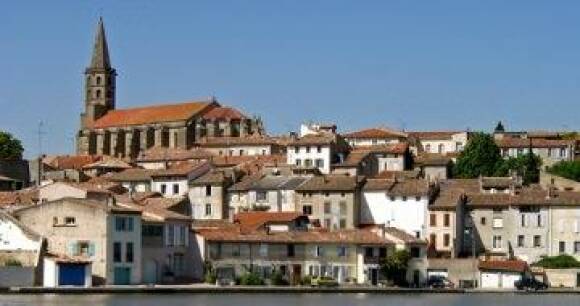
 Monument
Monument
Castelnaudary
This town, widely known for its Cassoulet, also features a number of interesting historical monuments, such as the Collegiate Church of Saint-Michel, the Moulin (windmill) de Curagel, or even the 13th century Chapel of Notre Dame de Pitié.
 Monument
Monument
Bram
Bram, the circular town with its 13th century church. At the House of Archaeology you can discover the ancient past of this city.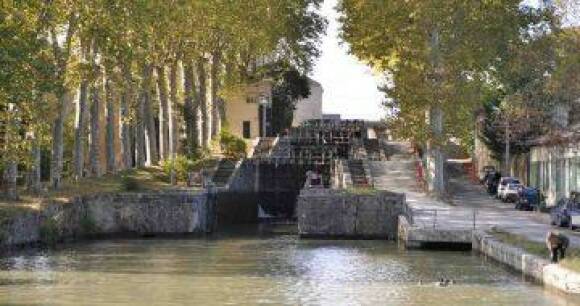
 River constructions
River constructions
the locks scale of Saint-Roch
This ladder of locks, near to Castelnaudary, was constructed in 1678. It was electrified by the Germans during the Second World War. Monument
Monument
Eglise de Villepinte
The church was built around an old Romanesque chapel, of which only remnants now remain within the new structure. The original construction, along with subsequent renovation work, was carried out in stages, with the most recent significant modification dating back to 1991. Monument
Monument
The Collegiate Church of Saint Michael
This magnificent 13th-century church overlooks the town of Castelnaudary with its beautiful bell tower. Don’t hesitate to step inside to discover its baroque high altar and grand organ. Monument
Monument
Lavoir et Epanchoir
Ancient washhouses are located opposite a magnificent eight-arched spillway that transfers excess water to the Fresquel River. These structures reflect the way of life of the time and are still in very good condition, allowing for clear observation from your houseboat. Monument
Monument
The Church of Saint Julien and Saint Basilisse
A true jewel of the village, it is the starting point of the “circular village.” Hidden in the heart of the town, it is one of the rare churches still found in France with a single nave featuring three rib-vaulted bays and a 36-meter bell tower. Come and discover its Gothic architecture, which dominates the village! Nature
Nature
Cybelle Island
Let yourself be tempted by this island, moor up discreetly and watch the animals, ducks and migratory birds, in their natural environment. Nature
Nature
Parc des Essars
The Parc des Essars is an ideal place for a stroll. At the heart of the park is an exhibition centre dedicated entirely to the visual arts and culture. Gastronomy
Gastronomy
the Cassoulet of Castelnaudary
 Swimming
Swimming
Le Lac de Buzerens
Lake Buzerens offers a variety of activities: fishing, supervised swimming, wakeboarding, paddleboarding, and water skiing. River constructions
River constructions
Le Pont-Canal du Tréboul
The Tréboul Aqueduct is one of the many structures along the Canal du Midi. Located in the commune of Lasbordes, it crosses the Tréboul stream, which later flows into the Fresquel. This aqueduct is situated just 100 meters from the Tréboul lock. River constructions
River constructions
Echelle du Vivier
The Vivier Lock is a staircase of three locks. Built around 1674, it is located 68.7 km from Toulouse, at an altitude of 154 meters. The neighboring locks are the Guillermin Lock to the east and the Gay Lock to the west. River constructions
River constructions
Ecluses de Saint-Roch
This series of four locks, built in 1678 at the exit of Castelnaudary heading toward Carcassonne, allows barges to overcome a 10-meter elevation difference. Nearby, two mills and a flour mill were constructed in 1680, adding a historical and industrial dimension to this remarkable site. River constructions
River constructions
The Cugarel Windmill
This former flour windmill from the 17th century operated until 1921. It overlooks the entire Lauragais plain, offering a beautiful panoramic view. River constructions
River constructions
Le Pont-Canal de Mezuran
One of the many aqueducts of the Canal du Midi, this one allows the canal to cross over a stream, while also offering an elevated view of the landscape and nature. Bike
Bike
Bike
Tow paths provide an ideal place to ride your bikeThe Locks
2 type(s) of lock(s) on The Canal du Midi- Automatic locks operated by boaters themselves, without a lock-keeper
- Automatic locks